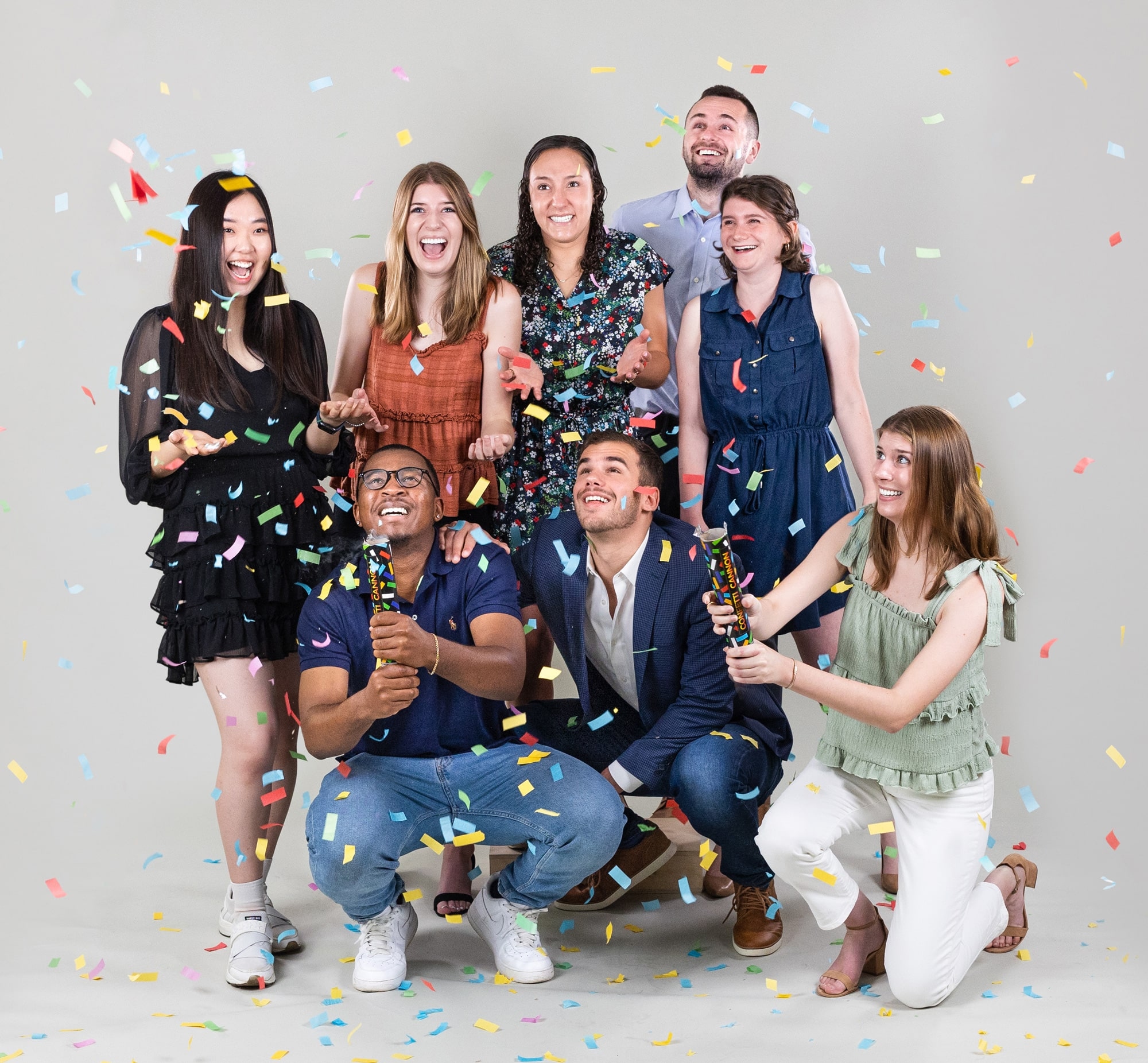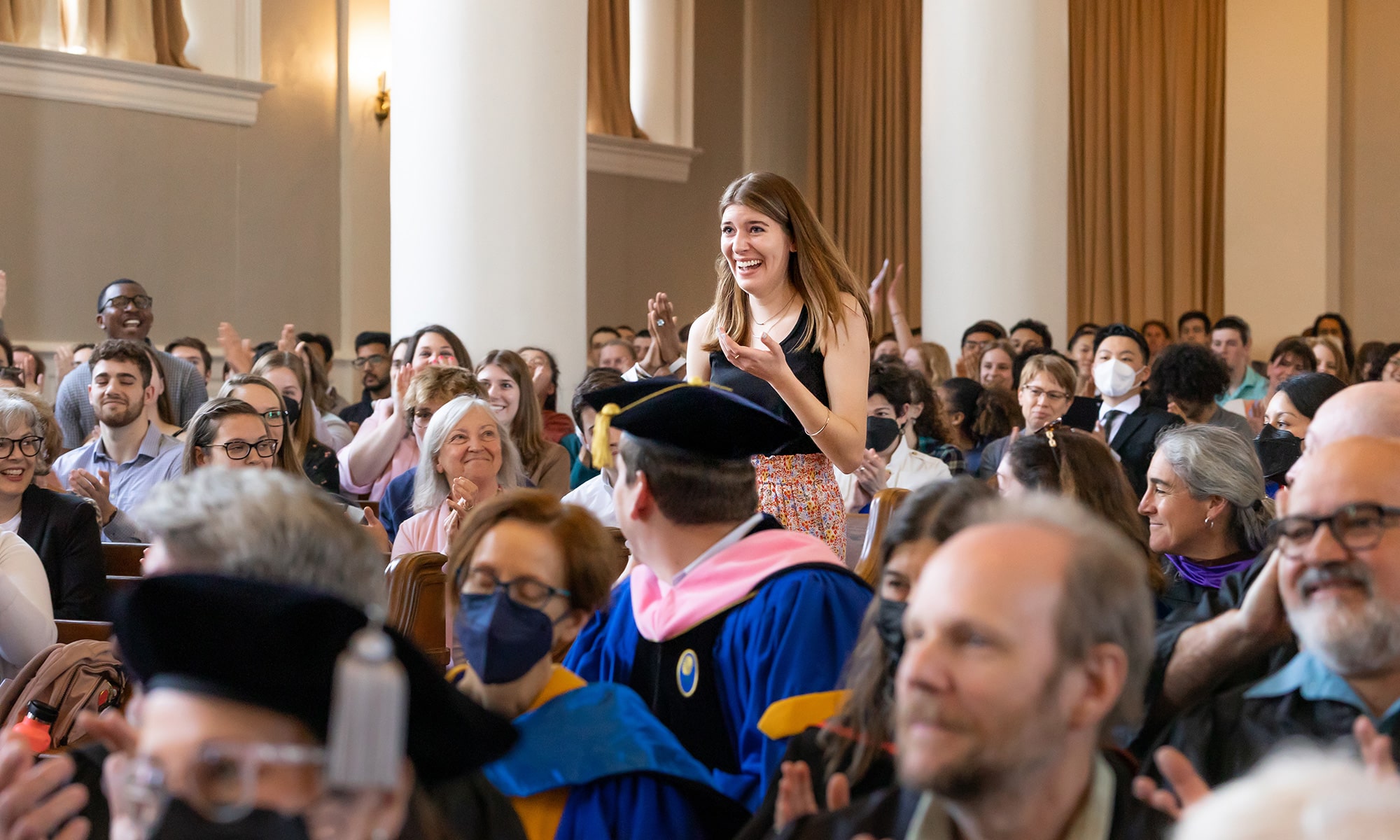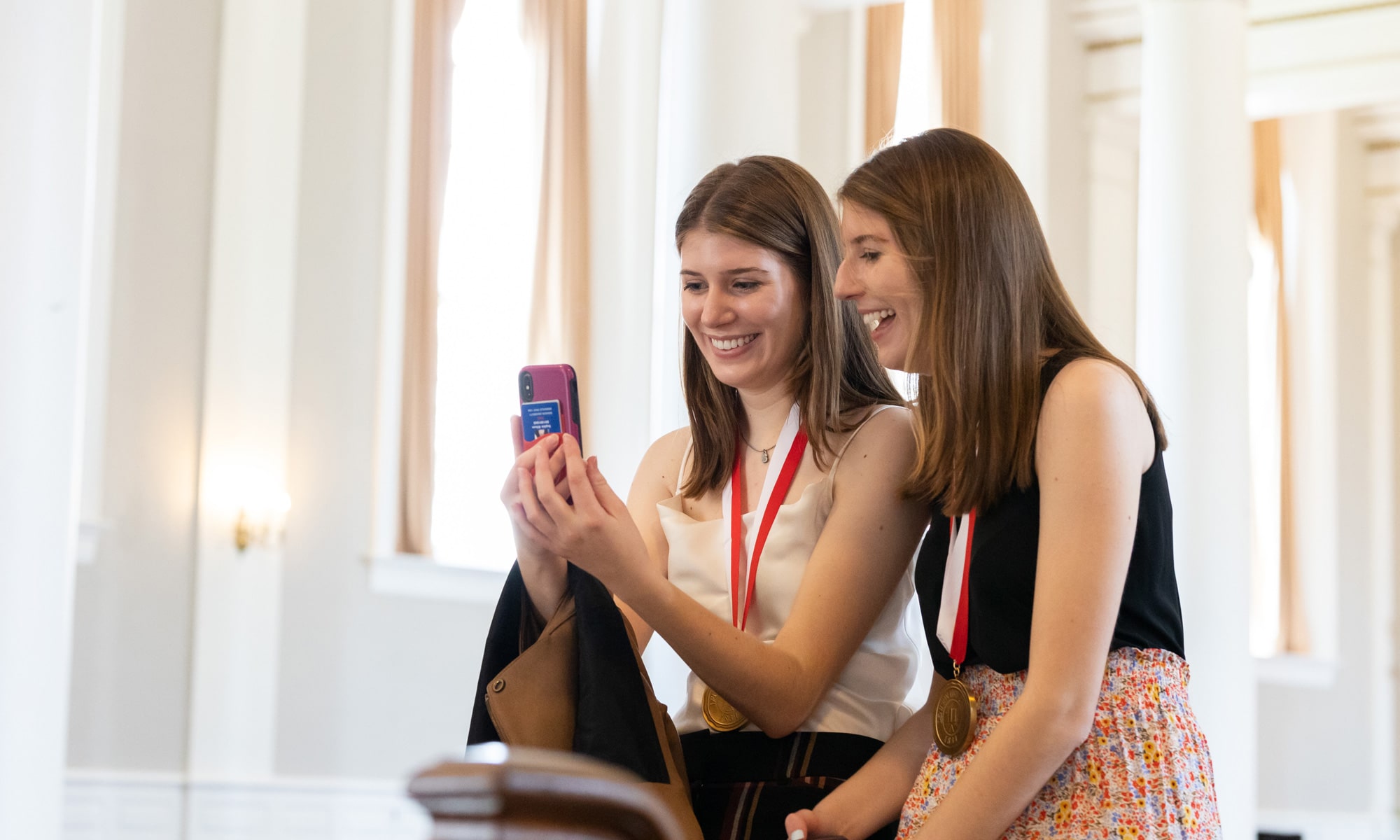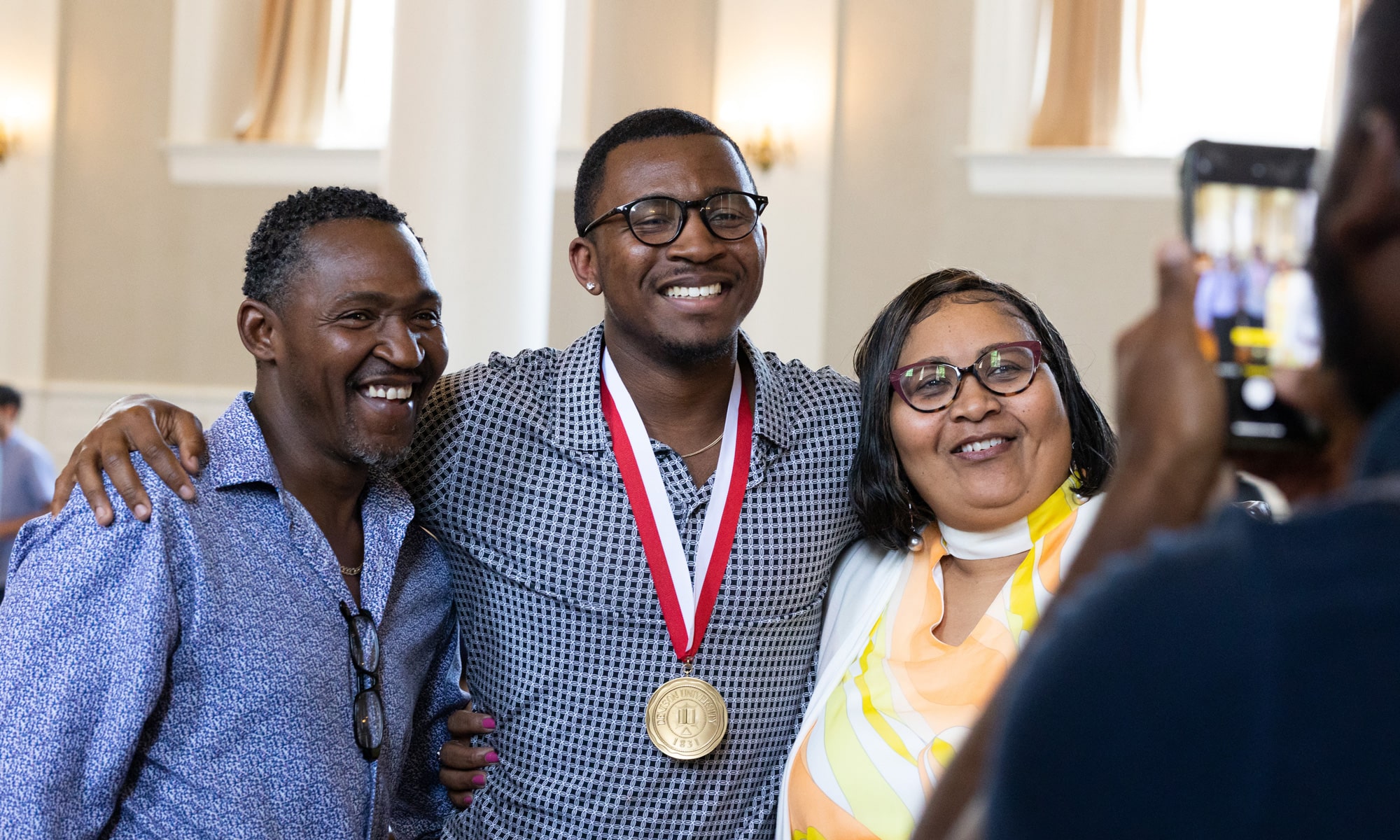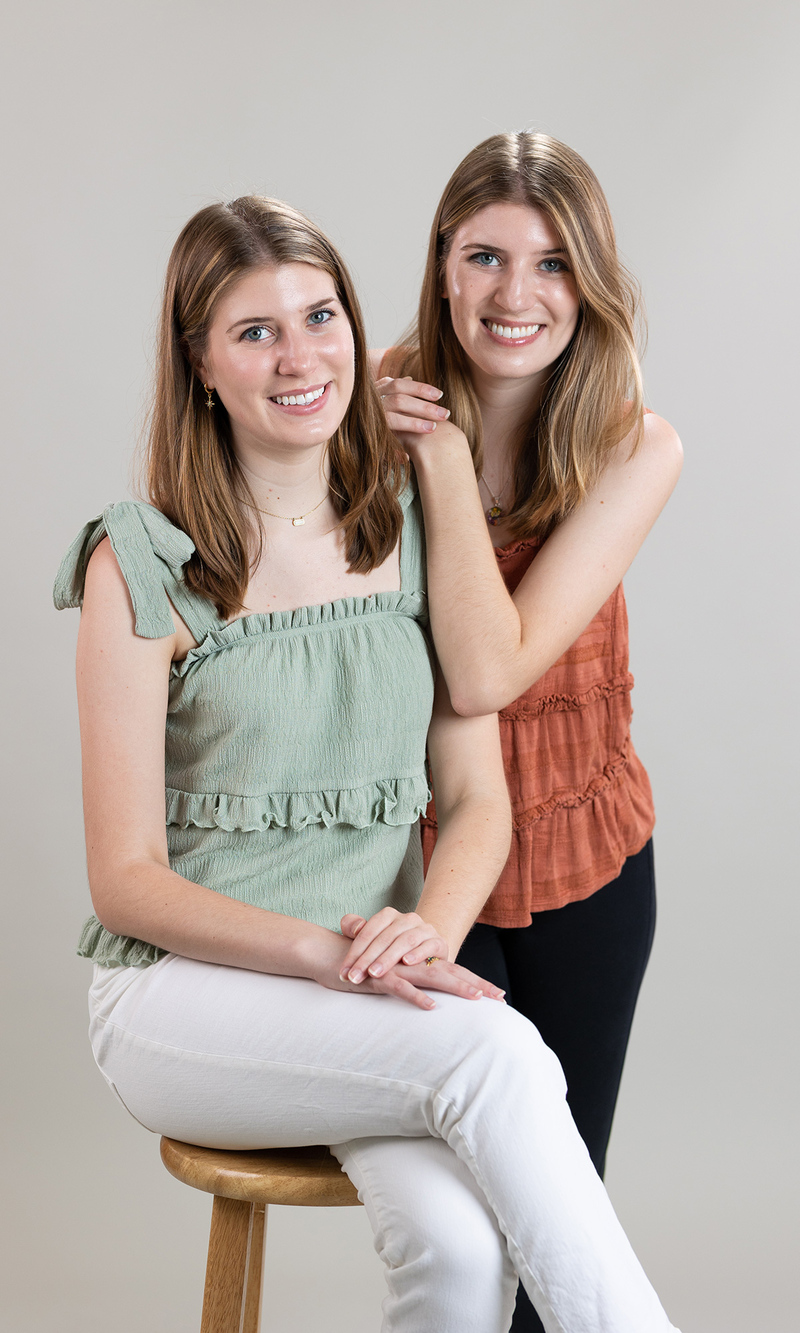
Masters of confidentiality
Six minutes after the ceremony concludes, Hannah and Sophie Gilson receive a message from their mother, Suzanne Harrington. There is no text, only an emoji of a woman’s mind being blown.
“That’s a good estimation of how she’s feeling,” the sisters agree.
Most parents would be thrilled with one child receiving the school’s preeminent student award, one that former Denison University President Andrew DeRocco once likened to a Rhodes Scholarship.
Suzanne Harrington and David Gilson are parents of two President’s medalists. Identical twins no less.
Hannah and Sophie were born seven minutes apart, which is roughly the same amount of time between their trips to the chapel stage to collect their awards. First-born Hannah, the day’s first President’s Medal recipient, fights back tears as she is presented with her prize. She makes eye contact with Andrew Katz, the advisor who helped her become a research assistant for the Lugar Center in Washington, D.C.
“He was sitting right in my line of sight and I kept looking over to him and thinking, ‘You are responsible for this,” Hannah says.
The primary criteria for President’s Medal selections is largely academic along with some combination of community service, work in the arts, leadership, athletic achievement, contribution to community discourse, and enlargement of Denison’s global perspective.
The Gilsons went about satisfying many of these categories in similar fashion. Each is a dual major in economics and political science. Each is a student orientation leader. Each is involved in the arts, participating in Jazz Ensemble and Chamber Singers.
“Sophie is enthusiastic, reliable, ambitious, and wicked smart,” wrote Heather Pool, the program director of philosophy, politics and economics and an associate professor in politics and public affairs, in her letter of recommendation for the award.
“From her first moments on campus, it was clear Hannah was well organized and eager to make a mark on this community,” wrote Katz, chair of political science and director of the Lugar Program in Politics and Public Service.
The President’s Medals make for a wonderful early birthday present. The twins turn 22 a few days later. David and Suzanne already were planning to visit their daughters when they were informed of the honors and asked not to spoil the surprise.
Suzanne, a psychotherapist, and David, a former dean of student affairs at the Cleveland Institute of Music, “are literal pros at confidentiality,” Hannah says. “They must not have told anyone else in the family because otherwise I think I would have heard.”
Hannah will teach English in Bulgaria after graduation as part of a Fulbright English Teaching Assistantship, while Sophie is applying for positions in the field of public policy and considering graduate school, her mother says.
“They didn’t go to Denison to be together,” Suzanne says. “They went to Denison because they believed it was the right place for each of them as individuals. It couldn’t have turned out better.”
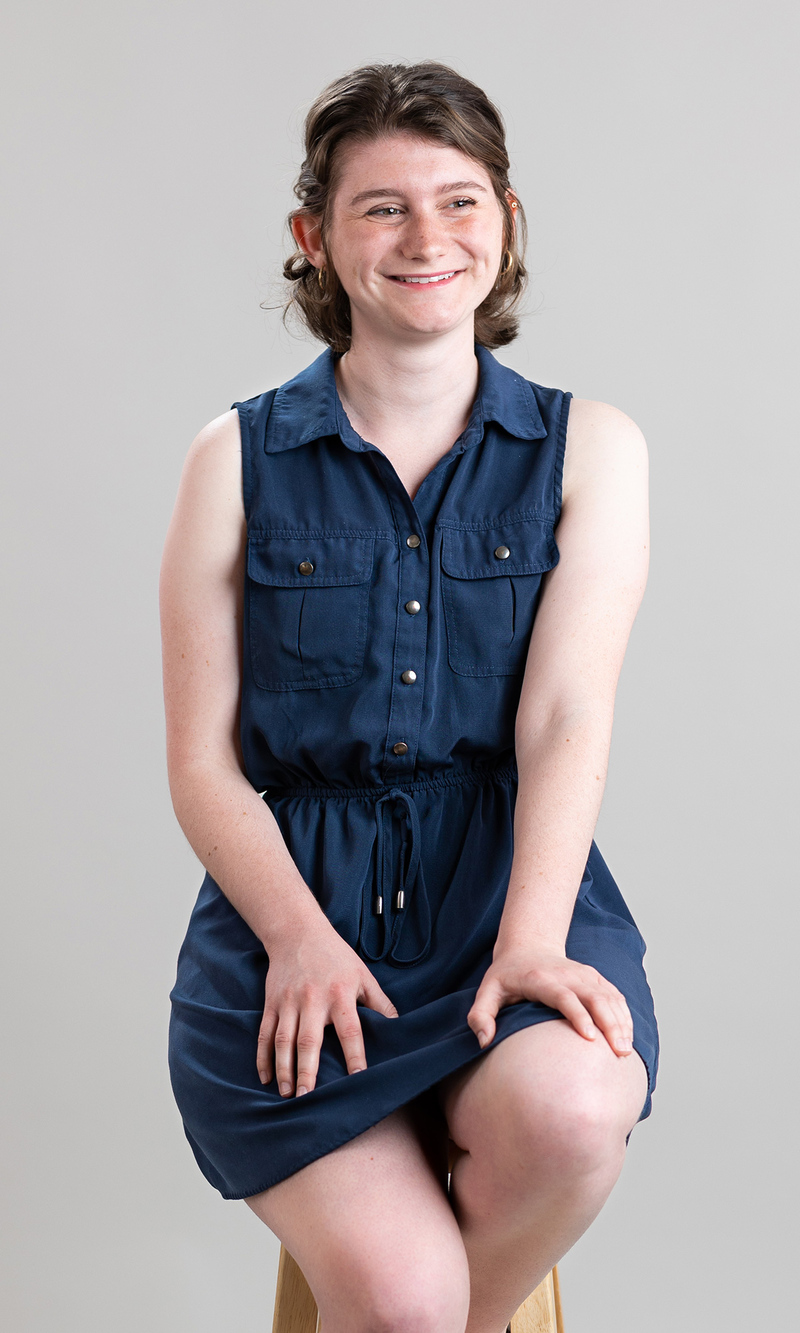
A storyteller’s tale
As the name Sarah Hume is announced, applause fills the chapel and necks crane to find her in the audience. A few seconds pass and nobody stands up to claim the award.
Meanwhile, the unsuspecting winner is across campus on a call, discussing a journalism fellowship she will be doing in Kentucky. Sarah is a gifted storyteller, and the day she won a President’s Medal is going to make for a memorable first-person account.
One of Sarah’s friends inside the chapel rings her: “You will never believe this.”
“I feel like I’m not a conventional leader — someone who’s out front,” Sarah says. “I truly had no idea I was going to win this.”
Obviously, Kari and Steven Hume can be trusted with a secret. Sarah’s parents were coming to Denison from suburban Detroit that night for her final performance in the American Roots Ensemble, in which she plays the standup bass. Mom and Dad were worried if they were spotted on campus six hours early for the ceremony, it might give away the surprise.
Their daughter’s wide range of interests — international studies, journalism, literature, geology, bluegrass music — made her a strong candidate for the President’s Medal.
“Sarah represents an ideal of Denison’s liberal education, as she has pursued her interest in human rights by seamlessly integrating an international studies major and narrative journalism concentration,” wrote International Studies Program Professor Taku Suzuki.
In 2022, Sarah published a story chronicling the environmental hazards of strip mining in Central Ohio for Belt Magazine. One of the article’s main sources, who developed black lung while repairing machinery for the digs, was so moved by the piece that he’s asked family members to place a copy of it in his casket when he dies, wrote Jack Shuler, chair of the journalism major.
While Sarah isn’t present for the medal ceremony, words of praise from her professors are read to the crowd. About 30 minutes later, she arrives at Swasey in time to receive her medal from President Weinberg as her friends cheer.
“What I don’t have anymore are all the nice words we spoke about you,” Weinberg tells Sarah. “But I will get those to you.”
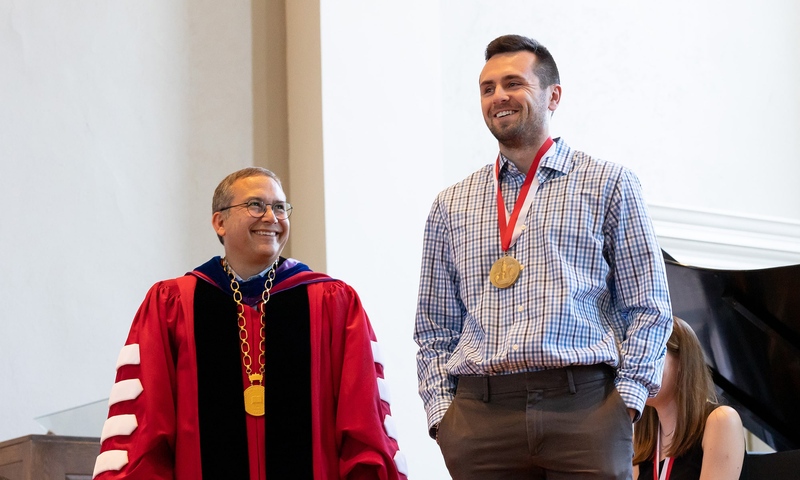
Portrait of a well-rounded student
Faculty Chair Jeff Thompson reads aloud from the letters of recommendation for Liam Jeanette. His research in the fields of computer science and physics are vast and his contributions to the symphony orchestra as a violinist are considerable.
But in a ceremony built around surprise, Liam, of Wheaton, Illinois, has managed to keep one his talents hidden away from most students and faculty members at Denison. He’s an accomplished artist whose charcoal drawings of people, pets, homes, and historic architecture have been earning him commissions for years.
“Most people at Denison don’t know,” Liam says. “I hadn’t taken an art class here until this year, so I don’t think it’s well known.”
Liam has combined his love of art and science to produce some astonishing work in the classroom. He’s digitized the landscape paintings of Bob Ross and used linear vector quantization to create alternative expressions of the artist’s work.
“Liam blended the marriage of advanced artificial intelligence and artistic analysis so seamlessly to make the two disciplines feel like lifelong siblings,” wrote Matt Kretchmar, chair of the Department of Computer Science.
Liam plans to pursue a PhD in Quantum Physics at Duke after spending a year at the University of Maryland.
“He was a very gifted student from the time he was young,” says his father, Michael. “But he’s also a very hard worker. He put everything he has into whatever he’s working on.”
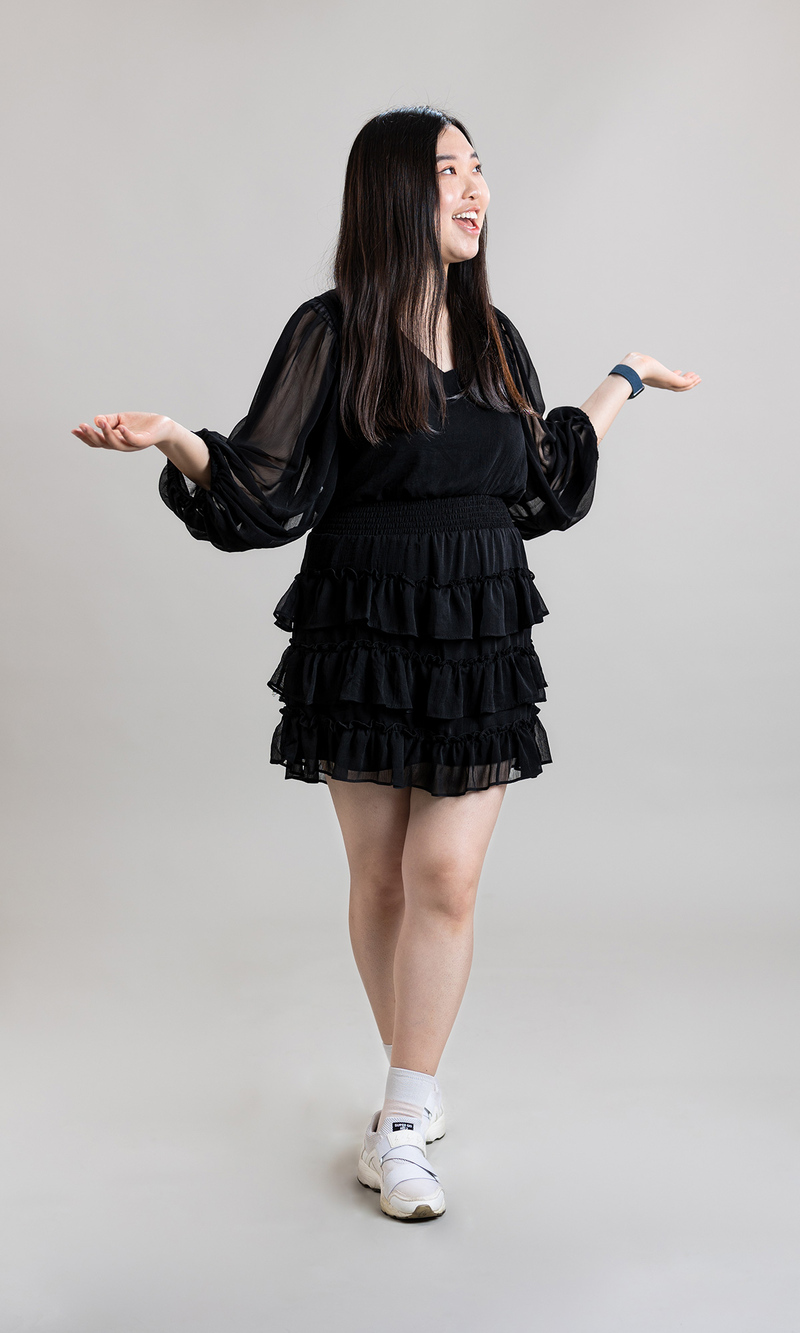
Walking on air
The bedroom alarm clock of Jusang and Eunjeong Moon has been set for 1:30 a.m. The South Korean family doesn’t make a habit of waking up in the middle of the night, but Mom and Dad aren’t going to miss the opportunity to watch their daughter Sueshin receive her medal.
“When we heard the news about the prestigious award, we were so happy that we felt like we were walking on air,” wrote Sueshin’s parents in an email translated by her older sister.
Nobody among the Class of 2022 President’s Medal honorees has literally — or figuratively — come further to earn the honor. Sueshin endured a trying freshman year at Denison in which she struggled to adjust to the food and culture, and considered transferring.
“During a lengthy conversation with me, her early record as a nascent campus leader here persuaded her of the value of keeping Denison as her college home,” wrote Political Science Chair Andrew Katz. “When Sueshin realized the impact she could have on campus and the role she could play as a student leader over her four years, her commitment to Denison was cemented.”
Sueshin excelled in the classroom and within the Denison community, even when she was 6,700 miles from campus. She spent her junior year at home in South Korea, learning remotely due to the pandemic, and working multiple jobs to help support her family.
There’s a 13-hour time difference between Granville and Seoul, meaning she was sometimes interacting with instructors and students in the wee hours of the morning, says Sueshin, a philosophy, politics, and economics major.
For someone who once thought of transferring, Sueshin has immersed herself in campus life, joining multiple organizations, governance committees and student support sites. She plans to work for an American-based company in Seoul for two years, her sister wrote, before returning to the United States to attend law school.
“I feel like I’ve gained so much, primarily relationships with professors, faculty and my peers,” Sueshin says. “This award is chosen primarily by professors and faculty members, and it means so much to be recognized by so many people.”
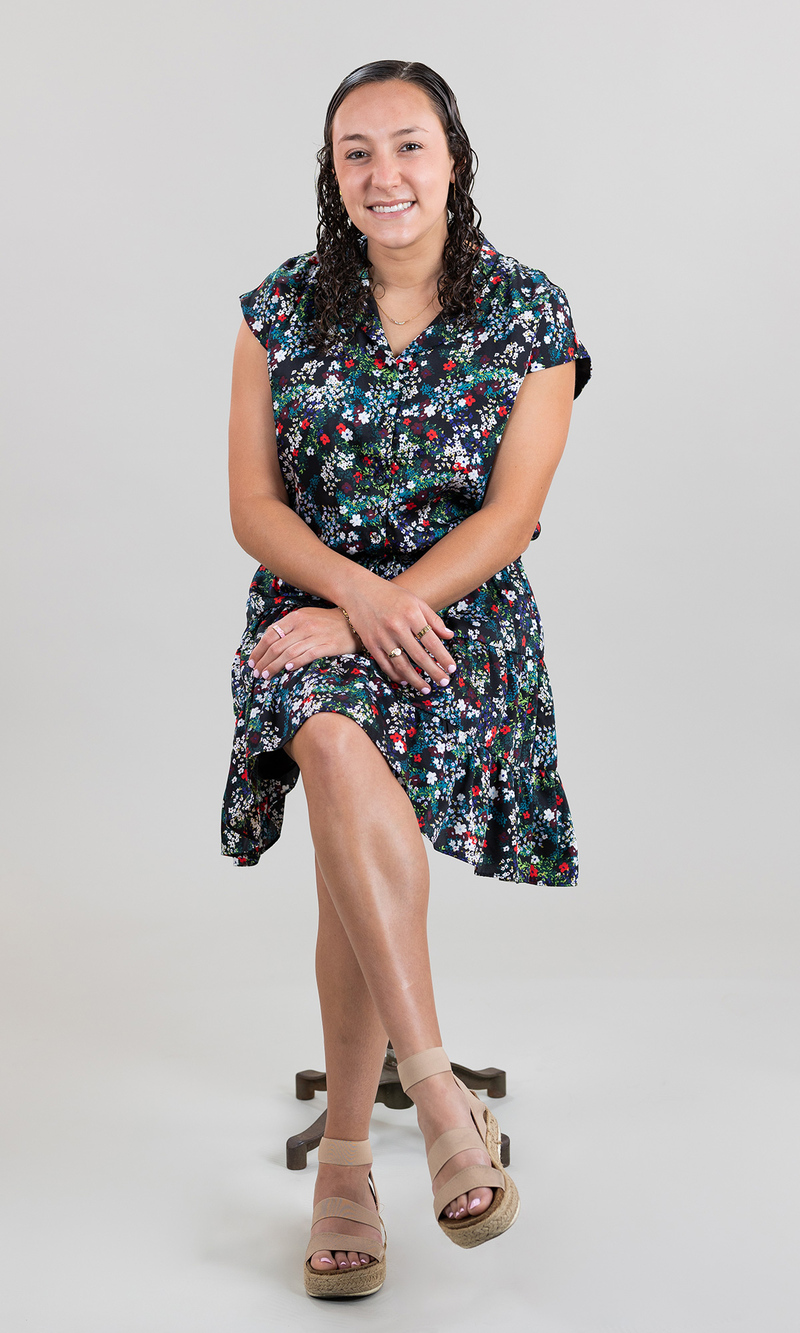
Head and shoulders above
Attorney Lisa Dunn is used to getting answers. On the day her daughter, Ariela Katz, receives Denison’s highest student honor, she is juggling a schedule filled with depositions in order to make time to watch the ceremony.
Her legal work produces more complete answers than her deposition of her daughter.
“I was trying to find out if she was going to the event on Friday,” says Lisa, of Deerfield, Illinois. “She gave me a detailed schedule of her week through Thursday. It’s supposed to be a surprise so I couldn’t say, ‘What are you doing Friday?’”
Ariela is present at Swasey Chapel to hear her name called. So is her sister, Talia, a sophomore at Ohio State, who makes the drive from Columbus to attend the ceremony.
A double major in economics and global commerce, Ariela was departmental fellow in two academic departments, a head tutor, a captain on the swim team, and the president of Hillel, a Jewish student organization.
“Ariela stands head and shoulders above her classmates in the 2022 cohort of global commerce majors for the breadth of her leadership, involvement, and success in the classroom and across campus,” wrote Karen E. Spierling, director of global commerce and professor of history.
The daughter of Lisa Dunn and Harold Katz will serve as a corporate analyst for JP Morgan Chase in Chicago.
“Ariela is the student professors call on because one knows she has done the work and is prepared,” wrote Jessica Burch, an assistant professor of global commerce. “She is the student who models for others what it means to be studious, mature, and responsible.”
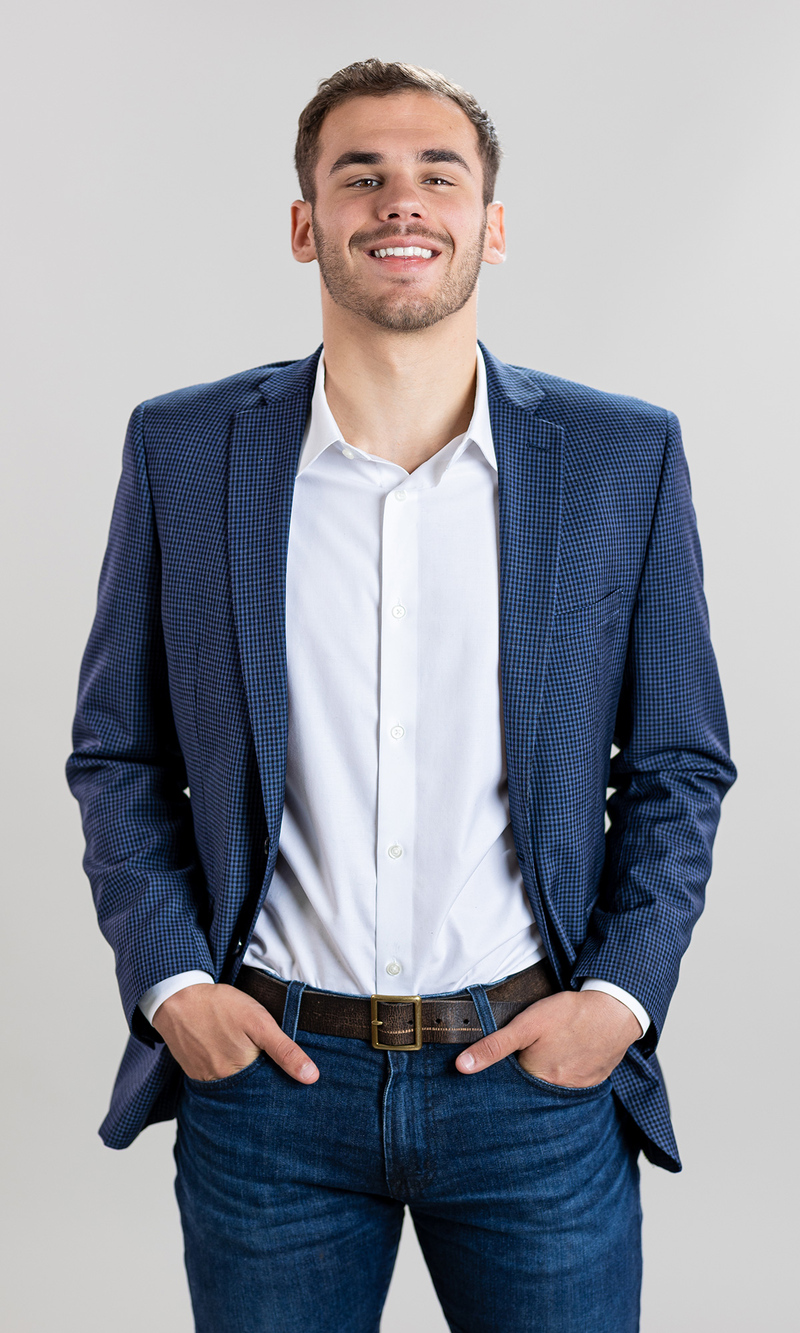
Among the top 1 percent
Sitting in the chapel pews, Max Sternberg has a hunch he’s about to celebrate the achievements of a good friend. Earlier in the week, his swim coach Gregg Parini strongly encouraged all team members to attend the awards ceremony.
Meanwhile, his parents, David and Robin, are sitting in their living room in California, watching the ceremony on a computer secure in the knowledge they let nothing slip. Max’s father has a penchant for inadvertently foiling surprises.
“I’ve not been letting David call Max before the ceremony,” Robin says from the family’s Bay Area home. “He could say something that would give him a clue.”
Max is caught off guard as his name is called. For his parents, the highlight of the ceremony is the praise from his swim coach, which is read to the audience.
“When measured by work ethic, commitment, and integrity, Max ranks among the top 1 percent of all the student-athletes and students I’ve worked with in my 36 years in higher education,” Parini wrote.
Like all medal winners, Max’s time management and organization skills are lauded. Majoring in the Philosophy, Politics and Economics program requires a heavy course load. Max not only thrived academically, but played viola for the string chamber ensemble and put in long hours as a swim team captain.
“But becoming an effective leader demands more than hard work and competence, it also requires an ability to connect with others with genuine empathy,” Parini wrote. “Gregarious by nature, Max is a thoughtful and insightful young man who cares deeply about his community and the people within it.”
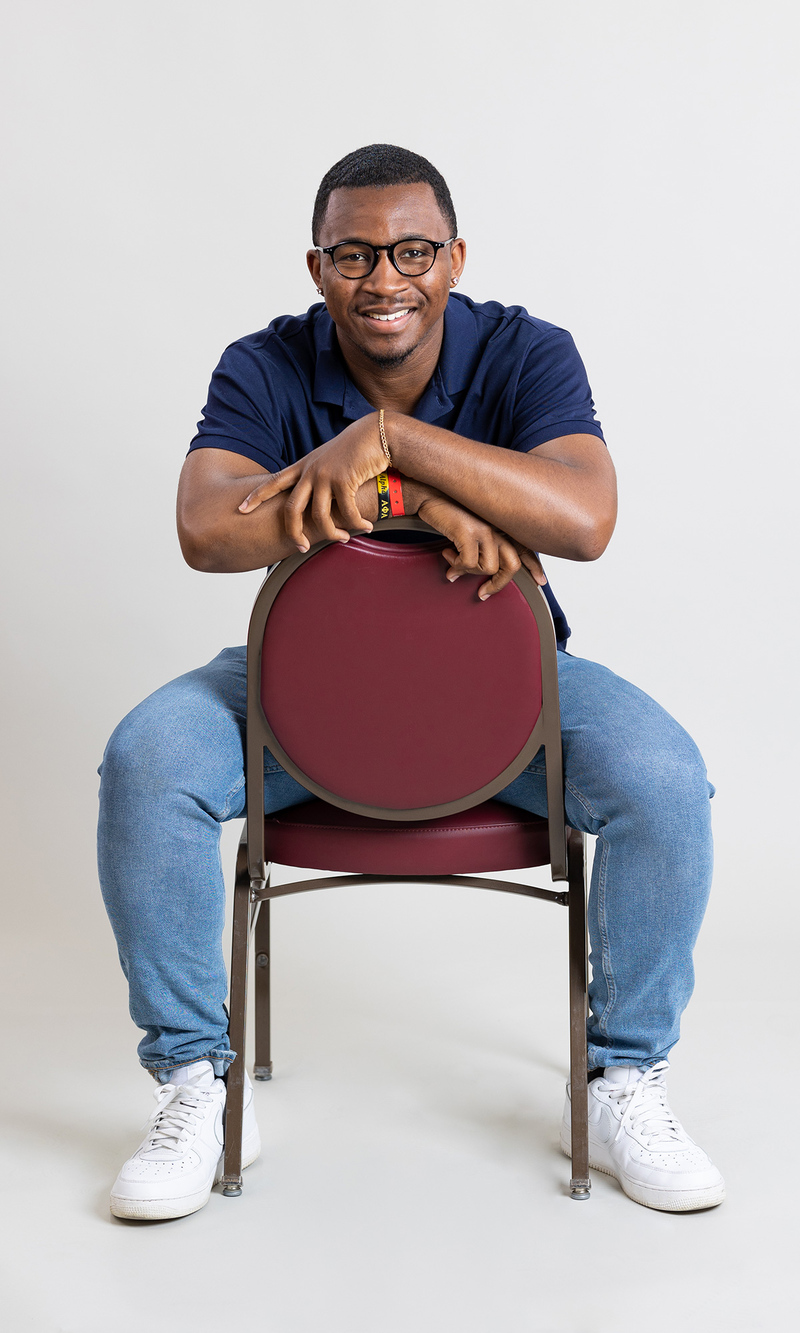
Big goals and great dreams
Six recipients sit on the stage facing the chapel audience. The hourlong ceremony is almost over and Ray is still in the crowd, thinking his parents might have made the drive to Denison to celebrate the achievements of others.
That’s when Faculty Chair Jeff Thompson reveals the final winner: Rayshon Cornell Walker.
The chapel erupts in rapturous applause. Ray’s father stands and yells, “Yes, sir,” repeatedly. Vickie tries to catch her son’s attention, waving to him as he makes the short jaunt to accept his medal. Several fraternity brothers shout out their fraternal call and Ray cups his hands around his mouth and returns the call.
“To round it all out like this, I don’t have the words,” Ray says. “A lot of this isn’t about me, that’s what I want people to understand. This is about my professors, it’s about the contacts that I’ve made and the relationships I’ve built. This medal is for all of them.”
Faculty members describe the double major in communications and anthropology/sociology as a visionary, the first dedicated video journalist for The Denisonian, a student who had “big goals and great dreams of what he wanted to accomplish,” wrote Brandon Morgan, the assistant director of Athletic Communications.
Ray’s engagement with faculty members and students is so lengthy — he’s a member of the University Conduct Board and the Antiracism Task Force as well as a vice president for the Black Student Union — that he’s selected to serve on the Denison Board of Trustees. As one of just two recent student trustees on the board, Ray is tasked with maintaining connections and representing student interest for the next two years.
In July, he will begin work at the NBC News Bureau in New York, where he will serve in a variety of roles.
“I got here and made the best of my experience, and it’s been one of the most transformative experiences of my life,” Ray says of his time at Denison. “I wouldn’t have changed the people I’ve met and the classes I’ve taken for the world.”
Ray looks outside the chapel doors and sees his proud parents waiting. He spots other President’s Medal recipients talking to faculty members and students.
He steps outside into the afternoon sun, eager to see what other surprises await.

